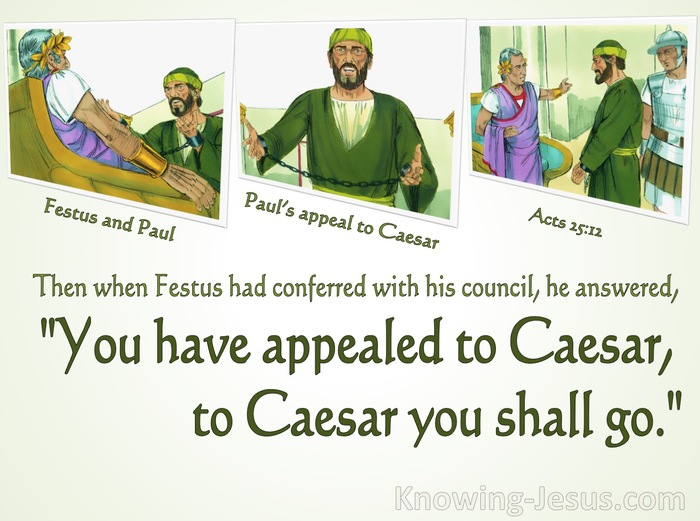26 Bible Verses about Authority, of human institutions
Most Relevant Verses
So, God allowed [or, abandoned] them to have the impure desires of their hearts, and to [practice] degrading behavior with their bodies among themselves. For they exchanged God's truth for the [devil's] lie, and worshiped and served what was created instead of the Creator, who is to be praised forever. May it be so. For this reason God allowed [or, abandoned] them to [practice] degrading passions; for their women exchanged the natural function [i.e., of sex] for what is against nature [i.e., lesbianism].
For they are servants of God for your good. But you should be afraid if you do what is evil, because they do not carry the sword [i.e., for executing criminals] for nothing. For they are servants of God who take revenge [on wrongdoing] by punishing the person who does evil.
Every person must be submissive to the ruling authorities, for all authorities come from God. And the existence of authorities has been established by God. Therefore, the person who resists [these] authorities is opposing what God has ordained. And those who oppose [these authorities] will bring judgment on themselves.
Jesus answered him, "You would not have any authority over me unless it were given to you from above [i.e., from God]. So, the person who turned me over to you is guilty of a worse sin."
Submit yourselves to every authority set up by people for the Lord's sake. [Submit to] a king as the [highest] authority,
This is the reason why you should pay taxes also. For the authorities are God's servants who continually tend to this matter [i.e., of collecting taxes].
[Offer them] for kings and for all people in prominent [governmental] positions, so that we can live a peaceful and quiet life in all reverence [toward God] and respectability [toward people].
or to governors who are appointed by him to punish wrongdoers, and to commend those who do right.
Every person must be submissive to the ruling authorities, for all authorities come from God. And the existence of authorities has been established by God.
So, tell us what you think. Is it lawful to pay taxes to Caesar, or not?" But Jesus perceived their wicked intention and said, "Why are you putting me to a test, you hypocrites? Show me the coin used for paying taxes." And they brought to Him a coin [Note: This coin was equivalent to one day of a farm laborer's pay, or about $60-$84 in 1994].read more.
He said to them, "Whose image and inscription are on this coin?" They answered Him, "Caesar's." Then He replied, "Pay to Caesar whatever belongs to Caesar and pay to God whatever belongs to God."
And when they arrived, they said to Him, "Teacher, we know that you are sincere, and [that you] do not care for [i.e., do not fear or give in to] anyone. For you do not allow [the position of] any person to influence you, but teach the truth about God's way. Is it lawful to pay taxes to Caesar, or not? Should we pay it, or should we not pay it?" But Jesus was aware of their hypocrisy and said to them, "Bring me the coin so I can see it." [Note: The amount of this coin was equivalent to one day of a farm laborer's pay, or about $60-$84 in 1994]. So, they brought it to Him and He said to them, "Whose image and inscription [are on this coin]?" And they answered Him, "Caesar's."read more.
Then Jesus replied to them, "Pay to Caesar whatever belongs to Caesar and pay to God whatever belongs to God." And they greatly marveled at Him.
Is it lawful to pay taxes to Caesar, or not?" But Jesus perceived their trickery, and said to them, "Show me the coin [used for paying the taxes]. [Note: This coin was equivalent to one day of a farm laborer's pay, or about $60-$84 in 1994]. Whose image and inscription are on this coin?" And they answered Him, "Caesar's."read more.
He replied, "Then pay to Caesar the things that belong to Caesar and pay to God the things that belong to God."
Therefore, you must submit [to the authorities], not only because of [the threat of] punishment, but also for the sake of [your] conscience. This is the reason why you should pay taxes also. For the authorities are God's servants who continually tend to this matter [i.e., of collecting taxes]. [So], pay everyone what you owe them; pay taxes to the tax collector; pay revenue to the revenue collector; show respect to the one deserving it; give honor to the one deserving it.
Remind the people [where you minister] to be in subjection to [civic] rulers, [governmental] authorities, to be obedient [to them], to be prepared for [doing] every good deed,
Submit yourselves to every authority set up by people for the Lord's sake. [Submit to] a king as the [highest] authority, or to governors who are appointed by him to punish wrongdoers, and to commend those who do right.
[So], pay everyone what you owe them; pay taxes to the tax collector; pay revenue to the revenue collector; show respect to the one deserving it; give honor to the one deserving it.
Show [proper] respect for everyone. Love your [Christian] brothers [and sisters]. Have an awe-inspiring respect for God. Show honor to the king.
But Peter and John replied, "You decide whether it is right before God to listen to you men or to Him;
They answered Him, "Caesar's." Then He replied, "Pay to Caesar whatever belongs to Caesar and pay to God whatever belongs to God."
Then Jesus replied to them, "Pay to Caesar whatever belongs to Caesar and pay to God whatever belongs to God." And they greatly marveled at Him.
He replied, "Then pay to Caesar the things that belong to Caesar and pay to God the things that belong to God."
By [having] faith, Moses' parents hid him for three months after he was born because they saw that he was a handsome child, and they were not afraid of the king's decree [to destroy all male Hebrew children].
First of all, then, I urge you to offer [special] requests, prayers, intercessions [Note: "Intercessions" probably refers to praying on behalf of others], and thanksgivings for all people. [Offer them] for kings and for all people in prominent [governmental] positions, so that we can live a peaceful and quiet life in all reverence [toward God] and respectability [toward people].
The next morning the city officials sent their officers [to the jailor] with the message, "Release those men." The jailor then informed Paul [of the officials' decision], saying, "The city officials have decided to release you so you may leave the jail [if] you go peacefully." But Paul responded to the officials, "These city officials had us innocent Roman citizens publicly beaten and thrown in jail. Are they now trying to release us privately? No indeed! Let the officials themselves come and [publicly] release us."read more.
So, the officers reported what Paul had said and the city officials became fearful when they learned that Paul and Silas were Roman citizens. So, they came and appealed to them [to leave peacefully]. Then the authorities themselves accompanied them out [of the jail] and asked them to leave the city.
The people had listened to Paul speaking up to this point [i.e., until he said the word "Gentiles"], then they raised their voices and shouted, "Do away with such a person from the earth; it is not right for him to live." And while the people shouted, waved around [torn] clothing and threw dust into the air, the commander ordered Paul to be brought to headquarters and requested that he be interrogated by means of a flogging, in order to learn the reason why people were shouting against him.read more.
Just as they were tying him up [in preparation] for the flogging, Paul said to the officer nearby, "Is it lawful for you to whip a Roman [citizen] before he has been [legally] condemned?" When the officer heard this, he [immediately] went and told the commander, saying, "What are you going to do? For this man is a Roman citizen." Then the commander came and said to him, "Tell me, are you [really] a Roman citizen?" Paul said, "Yes." The commander answered, "It cost me a large sum of money to obtain this [right of] citizenship." Paul replied, "But I am a Roman citizen by birth." Then those who were about to interrogate Paul [with whips] immediately left him, and the commander also became fearful when he realized that he had chained a Roman citizen [illegally].
Three days after Festus came to the province he went from Caesarea up to Jerusalem. The leading priests and the leading Jewish men [there] informed Festus of the charges against Paul. Then they begged him to do them a favor by having Paul brought [from Caesarea] to Jerusalem, for they were plotting to kill him on the way.read more.
Festus answered that [since] Paul was being held in custody in Caesarea, and [since] he himself was soon going there [i.e., he could see Paul at Caesarea at that time]. So, he said, "Let your leaders go down with me and if there is anything [found] wrong with the man, let them bring their charges against him [at that time]." After staying not more than eight or ten [more] days [there in Jerusalem], Festus went down to Caesarea and the following day he ordered Paul to appear before him as he sat in his court of justice. When Paul appeared, the [Jewish] leaders who had accompanied Festus down from Jerusalem gathered around him and brought many serious charges against him, which they were not able to prove. Paul replied in his defense, "I have not committed any sin against the law of the Jews, nor against the Temple, nor against Caesar." But Festus, wanting to gain favor with the Jews [See 24:27], answered Paul, "Are you willing to go up to Jerusalem and stand trial before me there?" Paul replied, "I am [already] standing before a court of Caesar's authority, where I deserve to be tried. I have done nothing wrong to the Jews, as you very well know. If then I am a criminal and have committed any crime that deserves the death penalty, I will not try to avoid being put to death. But if none of the charges I have been accused of are true, [then] no one has the right to turn me over [to the authorities]. I make my appeal to Caesar." After conferring with his advisors, Festus answered Paul, "[Since] you have appealed to Caesar, then you will go to Caesar."
Bible Theasaurus
- Human (514 instances)
- Institutions (1 instance)
Related Topics
- Attitudes Towards Kings
- Authority
- Be Subject To People
- Citizens, Christian Duties
- Citizenship
- Civic Duties
- Civil Government
- Civil authorities
- Giving Back
- Giving Money To The Church
- Giving To God
- Giving To Others
- Giving, Of Possessions
- God Possessing
- Government
- Honoring Authority
- Honour The Honourable
- Human Authority, Christian Response
- Human Authority, Instituted By God
- Human Authority, Nature Of
- Judicial Punishment
- Kingship, Human
- Knowing About God's Kingdom
- Leaders
- Leaders, Political
- Loving Everyone
- Loyalty
- Magistrates
- Ministry, Nature Of
- Obedience, To Human Authorities
- Orderliness In Society
- Politics
- Punishment, Nature Of
- Resistance

